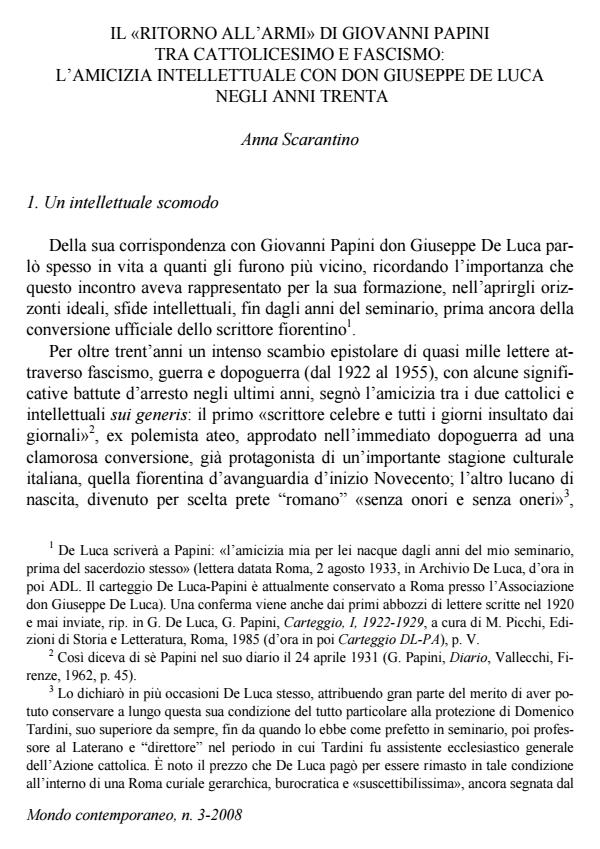Il "ritorno all'armi" di Giovanni Papini tra cattolicesimo e fascismo: l'amicizia intellettuale con Don Giuseppe De Luca negli anni Trenta
Journal title MONDO CONTEMPORANEO
Author/s Anna Scarantino
Publishing Year 2009 Issue 2008/3
Language Italian Pages 62 P. 67-128 File size 403 KB
DOI
DOI is like a bar code for intellectual property: to have more infomation
click here
Below, you can see the article first page
If you want to buy this article in PDF format, you can do it, following the instructions to buy download credits

FrancoAngeli is member of Publishers International Linking Association, Inc (PILA), a not-for-profit association which run the CrossRef service enabling links to and from online scholarly content.
Giovanni Papini’s «Return to Arms» between Catholicism and Fascism: The Intellectual Friendship with Rev. - In the Thirties, Anna Scarantino Giovanni Papini is well known for his literary work and as a champion of the new political culture of opposition (nationalist and authoritarian culture against the liberal and socialist ones) that emerged in Italy at the beginning of the XX century. His role in Fascist Italy after his conversion to Catholicism is less widely known. This essay focuses on some of the crucial moments in that period as seen through his 30-year long correspondence with Rev. Giuseppe De Luca, who was also one of the most influential, if somewhat "hidden", Catholic intellectuals in Italy between the two World Wars. The resulting picture is one of continuity in Papini’s determination to «revive the conscience» of the Italian people, even though this was done by making use of the ideological tools provided by a particularly conservative and anti-modern sort of Catholicism. His position towards Mussolini’s Fascism appears as less straight-forward. Papini moved from an initial distance or outright hostility to open approval and finally played an active role in supporting the Fascist war, which he justified in the name of the alleged (and mythical) rights of a spiritually "superior" Italian and Catholic civilization.
Anna Scarantino, Il "ritorno all'armi" di Giovanni Papini tra cattolicesimo e fascismo: l'amicizia intellettuale con Don Giuseppe De Luca negli anni Trenta in "MONDO CONTEMPORANEO" 3/2008, pp 67-128, DOI: